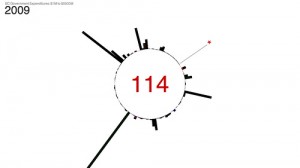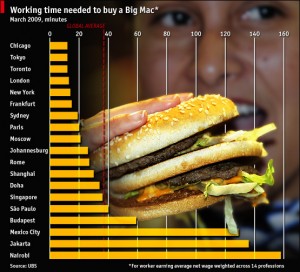as in comprehensible is difficult. This morning I was looking at a few of my favourite blogs and in Flowing Data came across a great multimedia educational site that uses multimedia to impart the idea of scale and cells. Wonderfully simple.
Citizen science is a great way to gather data for research. In this case a tool called ISpot facilitated the indentification of a moth found by citizen scientist.
I read this article this morning in the UK Independent about a young girl who found a moth on her windowsill. Her dad subsequently took a picture of it and posted it on ISpot. It was a new discovery for the UK but not a new species which was identified within 24 hours by an Open University expert.
The Moth was later added to the Natural History Museum‘s collection. Seems like this young girl is quite a nature enthusiast who was inspired to start visiting the museum.
Martin Harvey, a researcher at the Open University’s Biodiversity Observatory, who identified the moth, said: “Katie’s find demonstrates the power of the internet, and iSpot in particular, in helping everyone learn about wildlife.
Wonderful!
From Information Is Beautiful: Infographic on various billions spent, or planned, or earned:
Public sector information (PSI) aka government data access and sharing is culturally different than the sharing of data between and among scientists. And within science there are many different subgroups that have different takes on data sharing. This is also true when it comes to data preservation and archiving, and the consideration that all of these datasets are cultural heritage and national assets. One could argue that science data are also PSI or government data since most science is paid for with public research dollars. There is of course foundation money as well, and these too have a different data sharing culture.
The Online September issue of Nature is dedicated to the topic of data sharing in the sciences. Note, that does not necessarily include geomatics data, and yes folks, again a different data sharing culture.
Bref – different information ecologies and attention structures dictate how members of data creator communities do things.
This, I love:
The Open Dinosaur Project was founded to involve scientists and the public alike in developing a comprehensive database of dinosaur limb bone measurements, to investigate questions of dinosaur function and evolution. We have three major goals:1) do good science; 2) do this science in the most open way possible; and 3) allow anyone who is interested to participate. And by anyone, we mean anyone! We do not care about your education, geographic location, age, or previous background with paleontology. The only requirement for joining us is that you share the goals of our project and are willing to help out in the efforts.
Want to sign up? Email project head Andy Farke (andrew.farke@gmail.com), and welcome aboard!
[via datalibre]
The Government of Canada is soliciting feedback from Citizens on Copyright. The questions being asked are as follows:
1. How do Canada’s copyright laws affect you? How should existing laws be modernized?
2. Based on Canadian values and interests, how should copyright changes be made in order to withstand the test of time
3. What sorts of copyright changes do you believe would best foster innovation and creativity in Canada?
4. What sorts of copyright changes do you believe would best foster competition and investment in Canada?
5. What kinds of changes would best position Canada as a leader in the global, digital economy?
Please take a few minutes to comment as part of the Copyright Consultations.
The most efficient way to do this is a formal written submissions.. You can submit by sending an email to
- info@copyrightconsultation.gc.ca
. You can read all the submissions posted here. (see the right side of the Copyright Consultation Site).
The consultations will run until Midnight Sunday, September 13, 2009, so make sure your contributions are submitted before then.
For the curious, a draft submission by a CivicAccess.ca list member can be found at is Copyright 2009. He welcoms feedback and he also states:
Please grab anything you want from my submission towards your own.
Looks like a motion has been drafted for Open Data in the City of Calgary. City of Nanaimo has made some data accessible on its site. This is only a small sample and hopefully there will be more.
Tags: OpenData
Jon Udell’s latest innovators podcast, Open Data Access with Steven Willmott:
There’s growing awareness of the need to publish data online, and to support programmatic access to that data. In this conversation, host Jon Udell talks with Steven Willmott about how his company, 3Scale, helps businesses create and manage application programming interfaces to their data.
Says Jon on his blog:
In the latest installment of my Innovators podcast, which ran while I was away on vacation, I spoke with Steven Willmott of 3scale, one of several companies in the emerging business of third-party API management. As more organizations get into the game of providing APIs to their online data, there’s a growing need for help in the design and management of those APIs.
By way of demonstration, 3scale is providing an unofficial API to some of the datasets offered by the United Nations. The UN data at http://data.un.org, while browseable and downloadable, is not programmatically accessible. If you visit 3scale’s demo at www.undata-api.org/ you can sign up for an access key, ask for available datasets — mostly, so far, from the World Health Organization (see below) — and then query them. [more…]



Comments on Posts